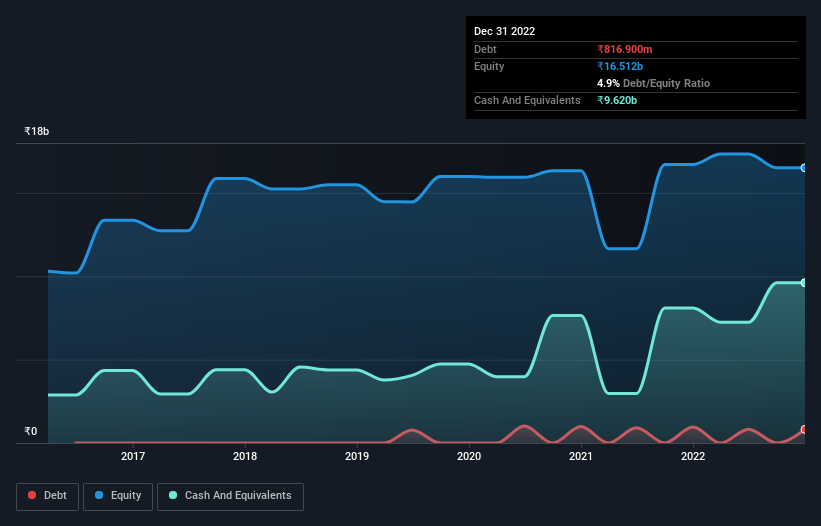
Howard Marks put it nicely when he said that, rather than worrying about share price volatility, 'The possibility of permanent loss is the risk I worry about... and every practical investor I know worries about.' When we think about how risky a company is, we always like to look at its use of debt, since debt overload can lead to ruin. Importantly, Colgate-Palmolive (India) Limited (NSE:COLPAL) does carry debt. But should shareholders be worried about its use of debt?
When Is Debt Dangerous?
Debt is a tool to help businesses grow, but if a business is incapable of paying off its lenders, then it exists at their mercy. In the worst case scenario, a company can go bankrupt if it cannot pay its creditors. However, a more frequent (but still costly) occurrence is where a company must issue shares at bargain-basement prices, permanently diluting shareholders, just to shore up its balance sheet. Of course, plenty of companies use debt to fund growth, without any negative consequences. The first thing to do when considering how much debt a business uses is to look at its cash and debt together.
View our latest analysis for Colgate-Palmolive (India)
How Much Debt Does Colgate-Palmolive (India) Carry?
You can click the graphic below for the historical numbers, but it shows that Colgate-Palmolive (India) had ₹816.9m of debt in September 2022, down from ₹958.5m, one year before. However, its balance sheet shows it holds ₹9.62b in cash, so it actually has ₹8.80b net cash.

How Strong Is Colgate-Palmolive (India)'s Balance Sheet?
We can see from the most recent balance sheet that Colgate-Palmolive (India) had liabilities of ₹11.8b falling due within a year, and liabilities of ₹846.4m due beyond that. Offsetting this, it had ₹9.62b in cash and ₹1.55b in receivables that were due within 12 months. So its liabilities total ₹1.48b more than the combination of its cash and short-term receivables.
This state of affairs indicates that Colgate-Palmolive (India)'s balance sheet looks quite solid, as its total liabilities are just about equal to its liquid assets. So it's very unlikely that the ₹399.6b company is short on cash, but still worth keeping an eye on the balance sheet. Despite its noteworthy liabilities, Colgate-Palmolive (India) boasts net cash, so it's fair to say it does not have a heavy debt load!
On the other hand, Colgate-Palmolive (India) saw its EBIT drop by 2.6% in the last twelve months. That sort of decline, if sustained, will obviously make debt harder to handle. When analysing debt levels, the balance sheet is the obvious place to start. But it is Colgate-Palmolive (India)'s earnings that will influence how the balance sheet holds up in the future. So when considering debt, it's definitely worth looking at the earnings trend. Click here for an interactive snapshot.
Finally, a business needs free cash flow to pay off debt; accounting profits just don't cut it. Colgate-Palmolive (India) may have net cash on the balance sheet, but it is still interesting to look at how well the business converts its earnings before interest and tax (EBIT) to free cash flow, because that will influence both its need for, and its capacity to manage debt. During the last three years, Colgate-Palmolive (India) generated free cash flow amounting to a very robust 86% of its EBIT, more than we'd expect. That positions it well to pay down debt if desirable to do so.
Summing Up
We could understand if investors are concerned about Colgate-Palmolive (India)'s liabilities, but we can be reassured by the fact it has has net cash of ₹8.80b. And it impressed us with free cash flow of ₹11b, being 86% of its EBIT. So is Colgate-Palmolive (India)'s debt a risk? It doesn't seem so to us. When analysing debt levels, the balance sheet is the obvious place to start. But ultimately, every company can contain risks that exist outside of the balance sheet. For example, we've discovered 1 warning sign for Colgate-Palmolive (India) that you should be aware of before investing here.
If you're interested in investing in businesses that can grow profits without the burden of debt, then check out this free list of growing businesses that have net cash on the balance sheet.
New: AI Stock Screener & Alerts
Our new AI Stock Screener scans the market every day to uncover opportunities.
• Dividend Powerhouses (3%+ Yield)
• Undervalued Small Caps with Insider Buying
• High growth Tech and AI Companies
Or build your own from over 50 metrics.
Have feedback on this article? Concerned about the content? Get in touch with us directly. Alternatively, email editorial-team (at) simplywallst.com.
This article by Simply Wall St is general in nature. We provide commentary based on historical data and analyst forecasts only using an unbiased methodology and our articles are not intended to be financial advice. It does not constitute a recommendation to buy or sell any stock, and does not take account of your objectives, or your financial situation. We aim to bring you long-term focused analysis driven by fundamental data. Note that our analysis may not factor in the latest price-sensitive company announcements or qualitative material. Simply Wall St has no position in any stocks mentioned.
About NSEI:COLPAL
Colgate-Palmolive (India)
Manufactures and trades in personal and oral care products in India.
Flawless balance sheet with solid track record.

